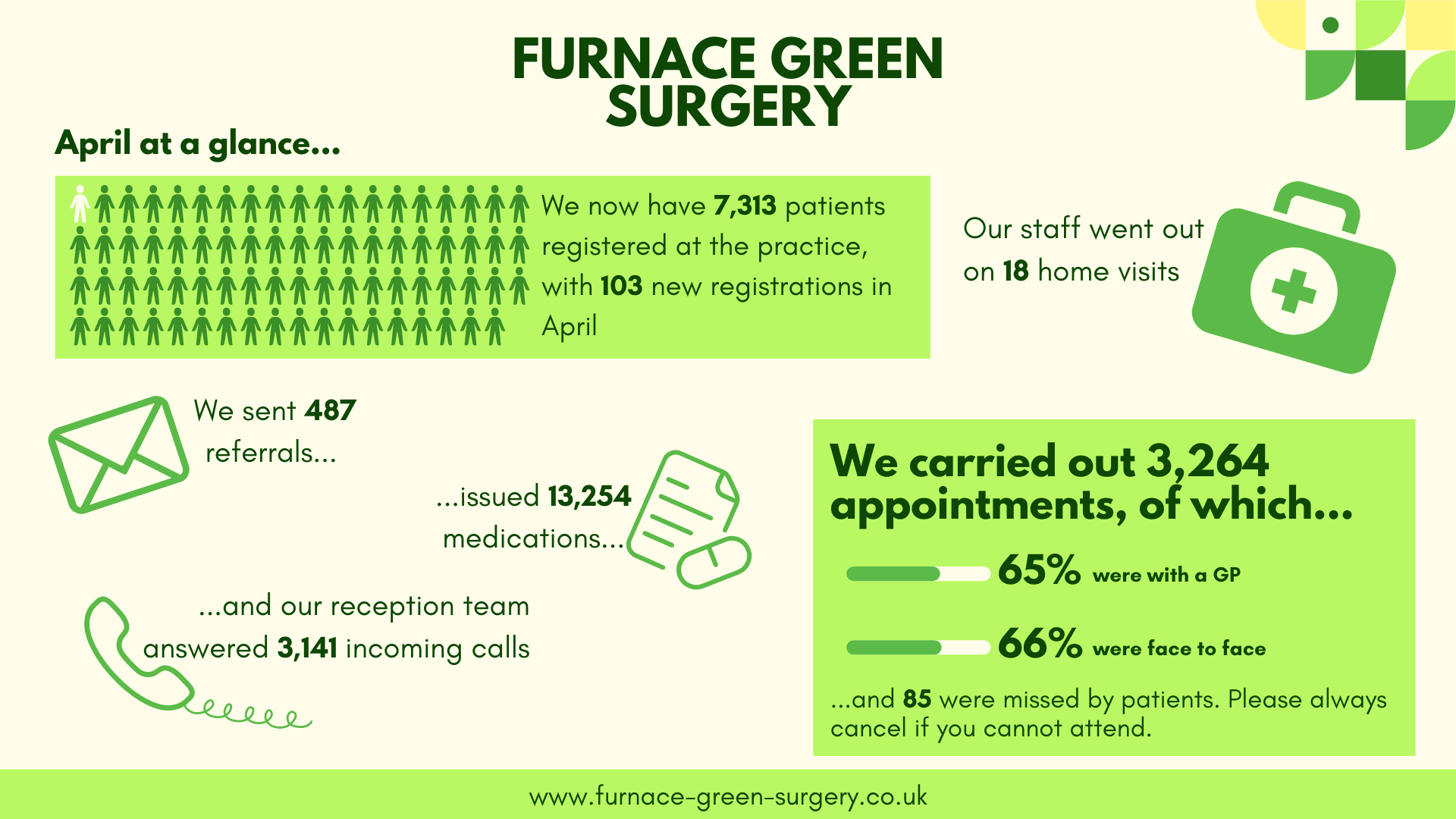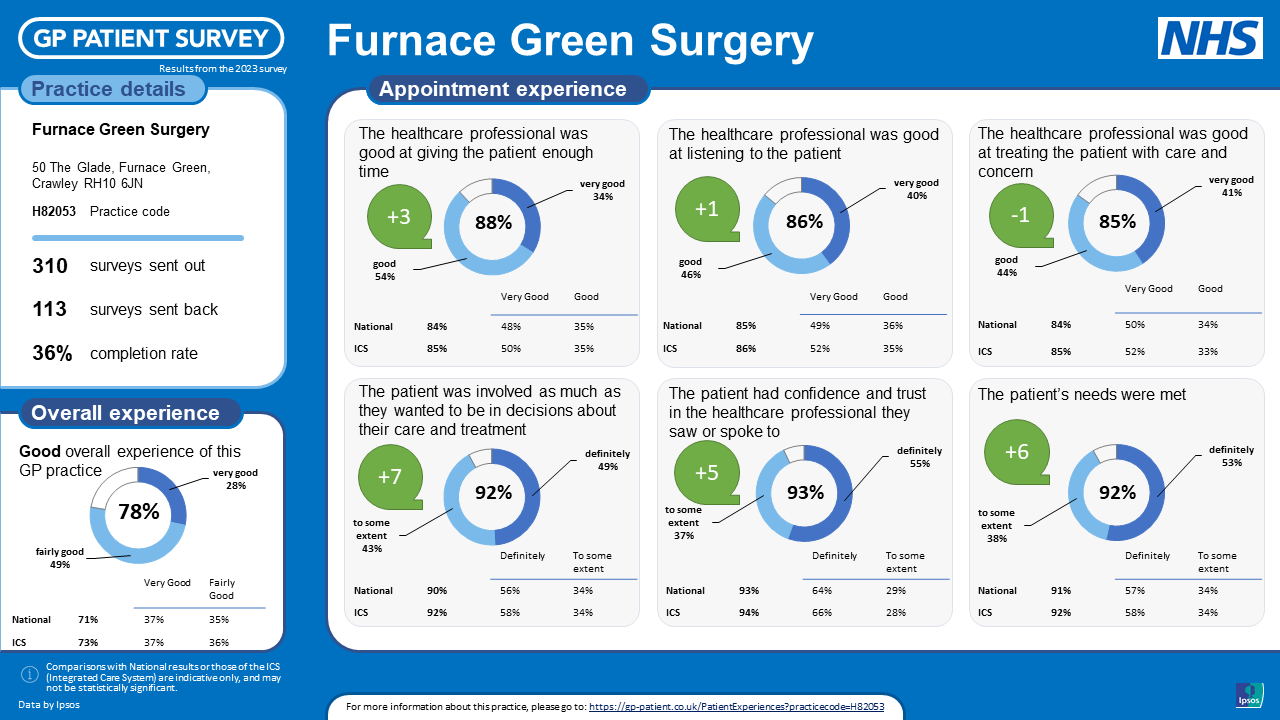Practice News
April at a glance...

Should I have a PSA test?
Following news about King Charles’s treatment, we’ve had quite a few questions about prostate cancer screening, so we thought we’d share some information on it.
There are currently national screening programmes for three types of cancer – breast cancer, bowel cancer, and cervical cancer – but not prostate cancer. This is because the tests used for prostate cancer are less accurate.
The blood test for prostate cancer is called PSA (prostate-specific antigen). A raised PSA may be a sign of prostate cancer, but can also be a sign of another condition, such as an enlarged prostate, prostatitis, or a urinary tract infection. The PSA test can also be affected by heavy exercise and ejaculation in the two days before the test.
Research has shown around 3 in 4 men with a raised PSA level will not have cancer, and around 1 in 7 men with prostate cancer would have a normal PSA result.
You have a higher risk of prostate cancer if you:
- have a family history of prostate cancer
- are of black ethnic origin
- are overweight or obese
- are over 50 years old
You can check your risk of prostate cancer online with Prostate Cancer UK.
Possible signs of prostate problems include changes in how you wee, or if it becomes painful to wee. Erectile dysfunction and lower back/hip pain are less common signs of prostate issues. These may all be caused by other conditions.
There’s more information on the NHS website.
Keep Antibiotics Working: World AMR Awareness Week
It's World AMR Awareness Week. AMR stands for Antimicrobial Resistance. Antimicrobial resistance occurs when bacteria, viruses, fungi and parasites change over time and no longer respond to medicines, making infections harder to treat and increasing the risk of disease spread, severe illness and death. The World Health Organisation have classed it as one of the top 10 global public health threats.
Why is AMR such a big threat?
Drug-resistant illnesses are becoming more and more common, including drug-resistant pneumonia, urinary tract infections and sexually transmitted infections. "Superbugs" which aren't treatable with existing medications are spreading rapidly across the world. In addition, countries all across the world are experiencing shortages of antibiotics.
If our current antibiotics continue to become less effective, and more superbugs emerge, more people will suffer and die from infections. In particular, medical procedures such as surgery will become much more risky. This would include common surgeries like hip replacements or caesarean sections.
What can you do to help prevent AMR?
- Prevent the spread of infections which might need treatment
- Wash your hands
- Stay at home when you're ill
- Wear a mask in crowded spaces, or if you may have a cough or respiratory infection
- Take medicines as advised by your doctor or healthcare professional
- If you are prescribed an antibiotic, antiviral, antifungal or antiparasitic medication, make sure you take the full course of medication as advised. Stopping early, even if you feel better, could mean your illness comes back and requires more treatment.
- If you have a condition which requires long-term antimicrobial treatment, like HIV or TB, or require long-term antibiotics to prevent infection, such as urinary tract infections or prosthetic joint infections, make sure you continue your treatment to reduce drug resistance.
- Trust your doctor to know when to prescribe antibiotics. Many winter illnesses are caused by viruses, such as COVID-19, sore throats, and many other common respiratory illnesses. Antibiotics do not work for viral illnesses, and prescribing too many antibiotics can increase antibiotic resistance.
- Spread the word!
- You can Go Blue for World AMR Awareness Week and share why you're doing so with your friends, families and colleagues.
Where can you find out more?
The World Health Organisation has much more information about AMR on its website.
Carers Rights Day - 23rd November
We've been updating our website ahead of Carers Rights Day on 23rd November. We now have a brand new "Carers Corner" where you can find all the information you need to know about the support available for carers in West Sussex.
Each year on November 23rd, Carers UK promotes Carers Rights Day. Whether someone has recently become a carer, realised they have been caring for a while without support or has been caring for someone for many years, it’s important they understand their rights and are able to access the support that is available to them whenever they need it.
Visit the Carers UK website to understand more about your rights as a carer. West Sussex Carers Support is also hosting some events for Carers Rights Day - visit their site to book in for an online session or find out where to visit them in person.
Important information for patients currently on hospital waiting lists
The NHS has been working hard to address the backlogs built up during the COVID pandemic.
To help, the NHS will be contacting patients who have been waiting a long time for hospital treatment. This is to remind people that they can ask to move to a different hospital where they may be seen quicker.
There is now a new website called the Patient Initiated Digital Mutual Aid System, or PIDMAS. If you have been waiting for 40 weeks or more, you can use this website to ask to change hospitals.
If you are eligible, your hospital will send you an SMS text message or a letter, explaining how to ask for a different hospital.
Please do not call the surgery about this, as your GP does not have any information about individual patients.
The hospital will contact you if you are eligible. Please do not contact them either.
You can find more information on hospital websites, like this one from the Royal Surrey County Hospital.
Autumn Newsletter
Welcome to our autumn newsletter! You can download a full PDF version of the newsletter or, if you need a screen reader, view a text-only version. If you would like a paper copy, you can also pop into reception to request one. This time, we'll be covering:
- our upcoming flu clinics
- information about other vaccination programmes this autumn
- some very happy staff news
- and advice about preparing for the weather to get colder
GP Patient Survey
The GP Patient Survey results are out! Thank you to everyone who responded to the GP survey this year. 78% of responders said they had a good or very good overall experience of the practice, compared to a national average of 71%. We will aim to keep improving and providing a good experience to our patients. You can see more information in the pictures below.
Hay fever
It's well and truly hay fever season! Hay fever can be treated with over-the-counter medications you can get from your local pharmacy. Ask your pharmacist for advice, and follow the NHS top tips to prevent hay fever symptoms taking over your summer. We've got more tips over on our Facebook page.
Lloyd's Pharmacy in Sainsbury's closing down
Lloyd's Pharmacy in Sainsbury's West Green will be closing in two weeks' time. If you need to check which pharmacy you have nominated, or choose a new pharmacy, you can do this online.
New Facebook Page
Following the launch of our new website, we have also started up a practice Facebook page. Follow for practice news, quick updates on events such as the phone system being down, and health information.
Spring Newsletter
Welcome to our spring newsletter! You can download a full PDF version of the newsletter or, if you need a screen reader, view a text-only version. This time, we'll be covering:
- our brand new website
- hay fever and what to do about it
- the new clinics available at Furnace Green Surgery
- and a quick glance at some key facts and figures about the work that goes on at the surgery each month

